Key takeaways:
- Dystopian novels reflect societal fears such as government control, environmental decay, and the loss of individual freedoms, prompting readers to reassess their values.
- Key themes include oppressive regimes, environmental collapse, and resilience in adversity, which resonate deeply with contemporary issues.
- Popular titles like “1984,” “Fahrenheit 451,” and “The Handmaid’s Tale” serve as catalysts for critical reflection on personal beliefs and societal structures.
- Discovering dystopian literature can be enhanced through online book lists, local bookstores, and social media communities that share recommendations and insights.
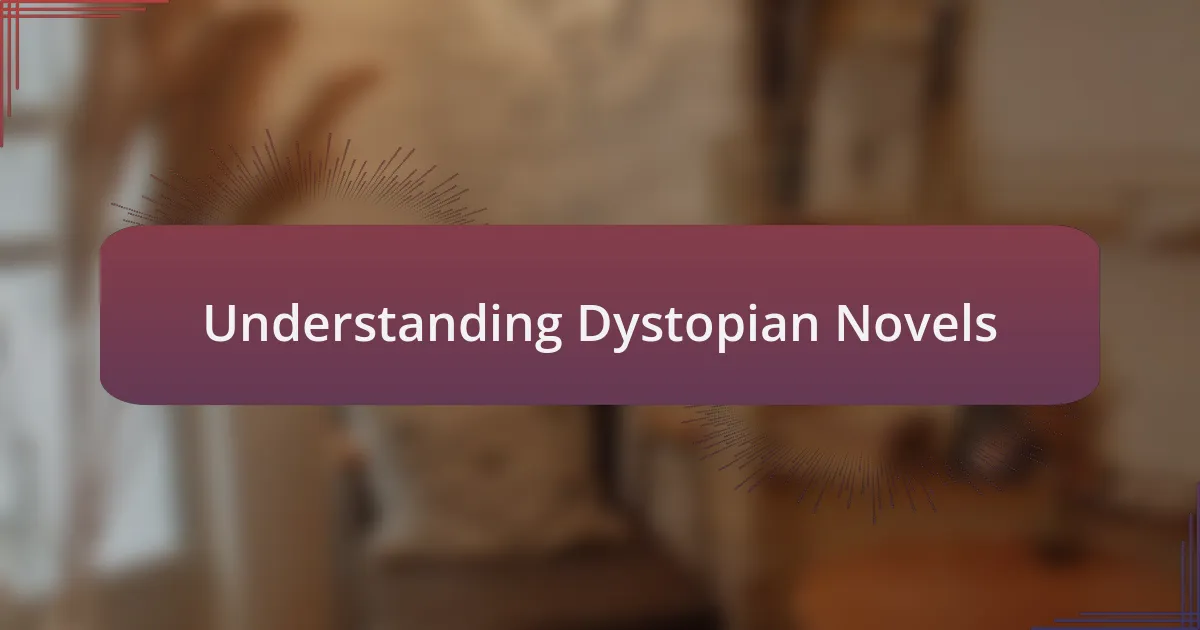
Understanding Dystopian Novels
Dystopian novels serve as a mirror to our society, reflecting fears of government control, environmental decay, and societal collapse. I remember reading “1984” by George Orwell and feeling a heavy weight in my chest as I absorbed the bleak reality he painted. It had me questioning the extent to which we allow our freedoms to be eroded in the name of security.
At their core, these stories challenge us to reevaluate our values and the world we inhabit. Have you ever wondered what the future might look like if current trends continue unchecked? I often find myself pondering the implications of technology in our lives as I explore novels like “Fahrenheit 451,” where censorship threatens not just books, but the very essence of free thought.
Furthermore, the emotional impact of dystopian narratives often lingers long after I’ve closed the last page. I distinctly recall feeling both a sense of dread and a spark of hope after finishing “The Handmaid’s Tale.” The characters often grapple with resilience in the face of immense adversity, allowing readers to process their own fears while igniting a desire for change.
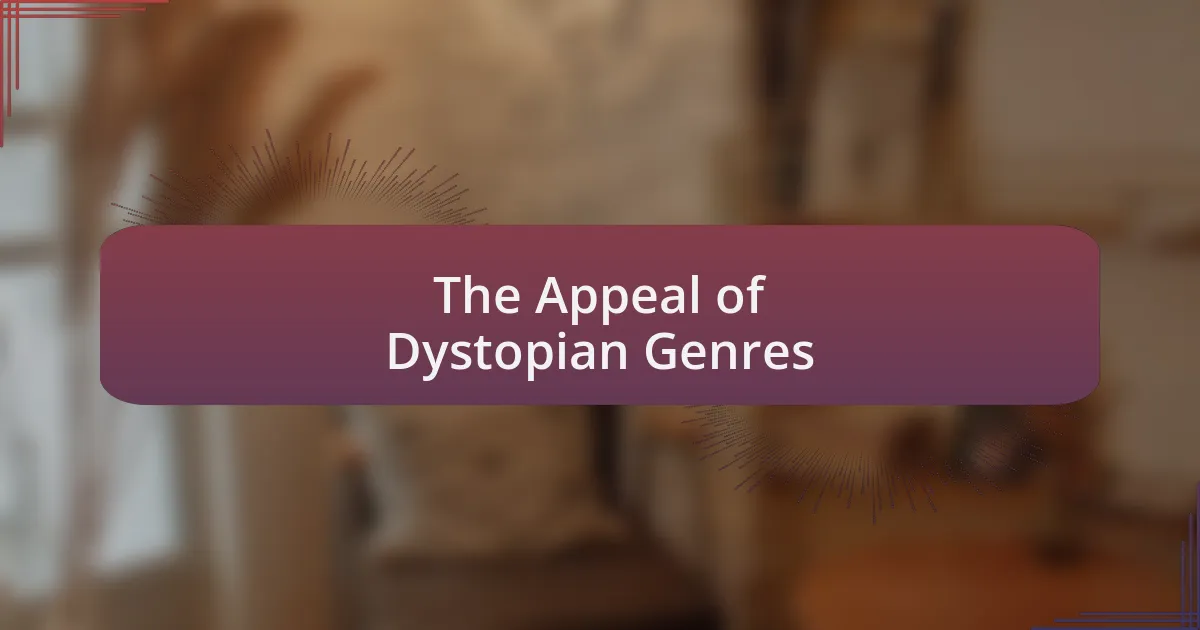
The Appeal of Dystopian Genres
The appeal of dystopian genres lies in their uncanny ability to spark reflection on our current reality. I recall feeling a chilling sense of recognition while reading “The Road” by Cormac McCarthy—it forced me to confront the fragility of our existence. In these narratives, the extreme conditions often echo the struggles we face today, making it hard to look away.
Reading about oppressive regimes or environmental disasters evokes a mix of fear and fascination. I often find myself questioning, “Could this really happen?” That uncertainty can be thrilling, drawing me deeper into the story, while also pushing me to think critically about our societal choices and their potential consequences.
What captivates me the most is how these novels invite readers to envision their own agency in unimaginable circumstances. For instance, in “Station Eleven,” I felt a profound connection to the characters’ drive to preserve culture amid chaos. It instills a sense of responsibility in us to cherish what we have and strive for a better world, even when faced with despair.
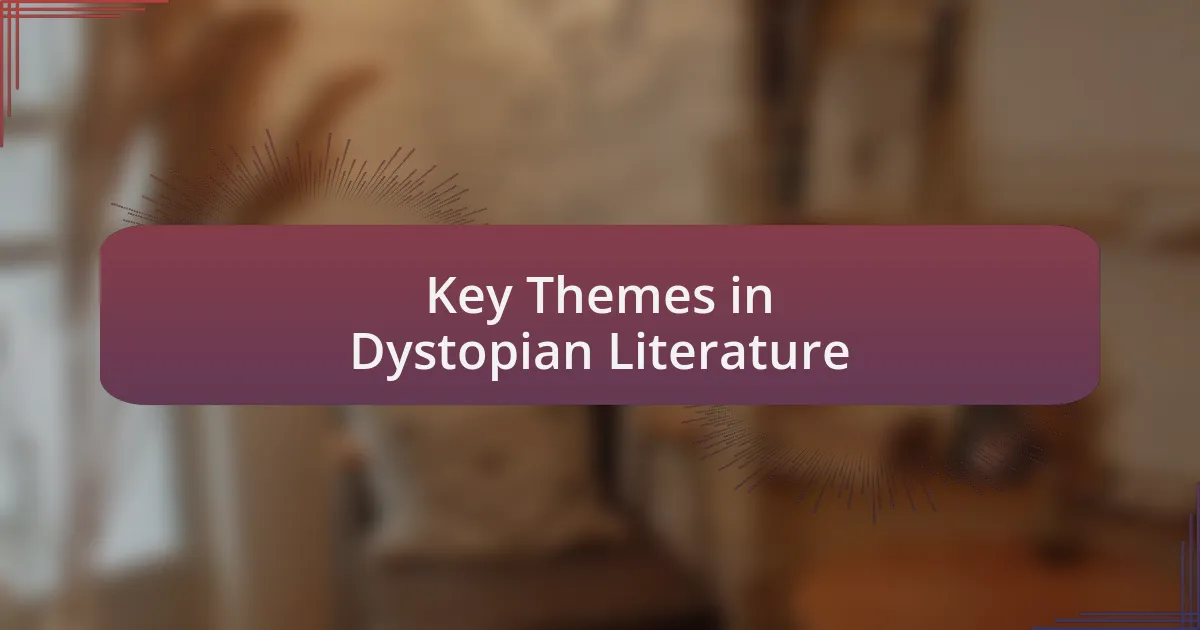
Key Themes in Dystopian Literature
Dystopian literature often explores themes of oppressive government control, as seen in classics like “1984” by George Orwell. The chilling surveillance and manipulation of truth in such narratives resonate with me; they make me reflect on issues like privacy and freedom in our own society. Have you ever felt that unease when scrolling through your phone, wondering who might be watching?
Another significant theme is the impact of environmental collapse, depicted powerfully in stories like “The Handmaid’s Tale” by Margaret Atwood. Reading about societies grappling with resource scarcity and ecological disasters makes me anxious yet aware. It prompts a critical reflection on how our current actions impact the planet’s future and challenges me to think about sustainable living. Isn’t it unsettling to consider how our choices today shape tomorrow’s world?
Lastly, I find that the theme of resilience shines brightly in dystopian narratives. Characters like those in “The Martian” by Andy Weir embody hope and human ingenuity in the face of dire situations. Their determination often stirs something within me, pushing me to confront my challenges with a similar spirit. I wonder, can we channel that same resilience in our daily lives, despite feeling overwhelmed by the chaos around us?
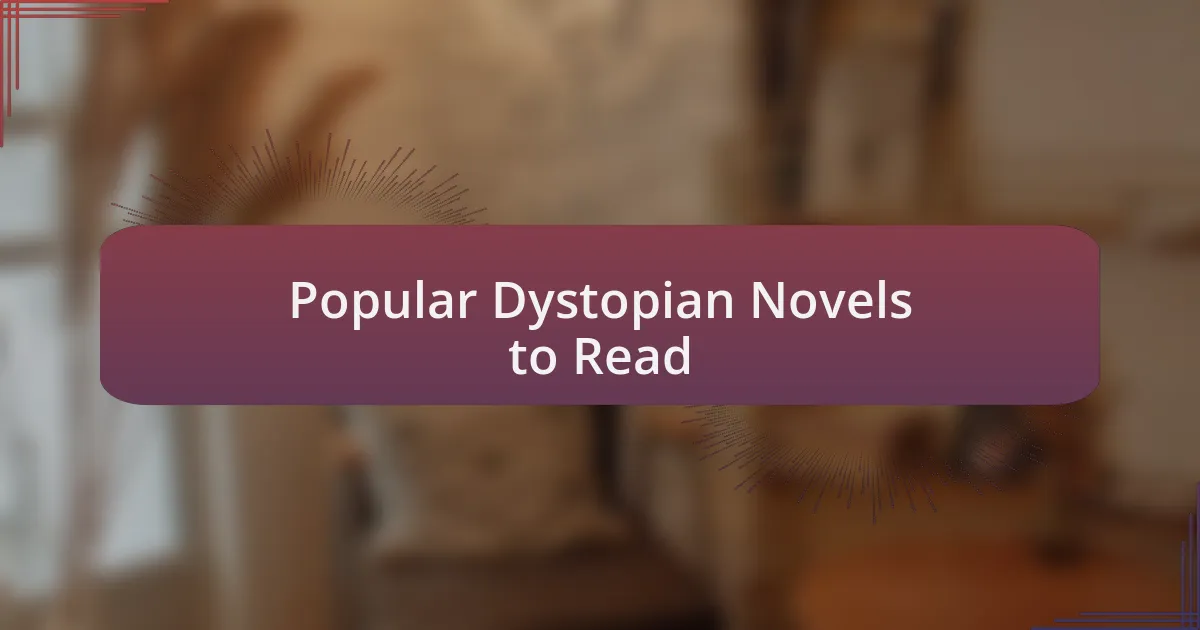
Popular Dystopian Novels to Read
There are some truly captivating dystopian novels that have made a lasting impact on readers. Among them, “The Road” by Cormac McCarthy stands out with its haunting portrayal of a father and son navigating a post-apocalyptic world. I remember feeling each of their struggles deeply; it made me think about what I would do to protect those I love in the face of total devastation. Have you ever wondered how far you would go for family?
Another profound read is “Fahrenheit 451” by Ray Bradbury, which tackles the dangers of censorship and the loss of individuality. The idea that society would ban books struck a chord with me, especially in today’s age of misinformation. At times, I feel like we’re walking a thin line between knowledge and ignorance; can we truly appreciate art and literature if we can’t question authority?
Lastly, “The Hunger Games” by Suzanne Collins captivates with its exploration of inequality and survival. Katniss Everdeen’s fierce spirit resonated with me. I found myself cheering for her resilience while also reflecting on the societal structures around me. It’s this blend of entertainment and introspection that I love about dystopian novels. Is it possible that fiction could inspire real change in our world?
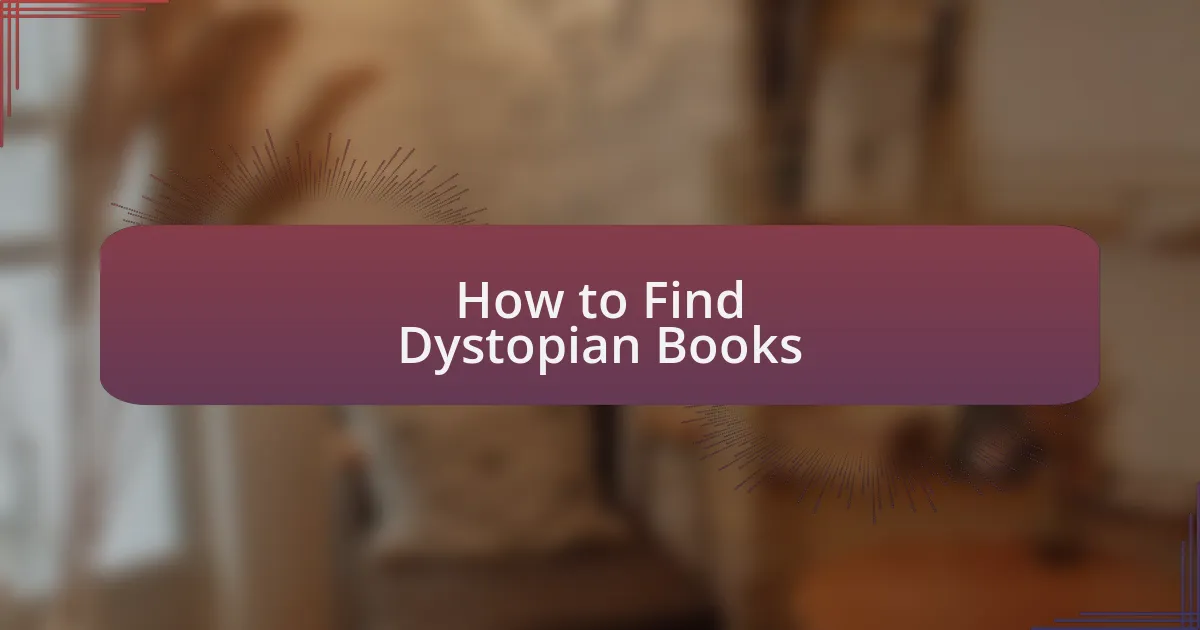
How to Find Dystopian Books
When it comes to finding dystopian books, one of my go-to methods is exploring thematic book lists online. Sites like Goodreads offer curated lists where readers share their favorites based on topics like future societies or totalitarian regimes. Have you ever stumbled upon a book recommendation that changed the way you view a genre? I remember discovering “The Handmaid’s Tale” this way, and it was a revelation.
Another fantastic way to unearth hidden gems in the dystopian genre is by visiting your local independent bookstore. I often enjoy chatting with the staff, as they usually have insightful suggestions based on what I’ve previously read. There’s something special about a personal recommendation; that moment of connection can guide you to a book that resonates deeply.
Lastly, I find that browsing social media platforms can lead to exciting discoveries. Bookstagram and BookTube are vibrant communities where readers discuss their latest finds. I’ve had many instances where scrolling through these platforms introduced me to authors I never would have encountered otherwise. It’s like having a book club at your fingertips; isn’t it fascinating how technology can enhance our reading journeys?
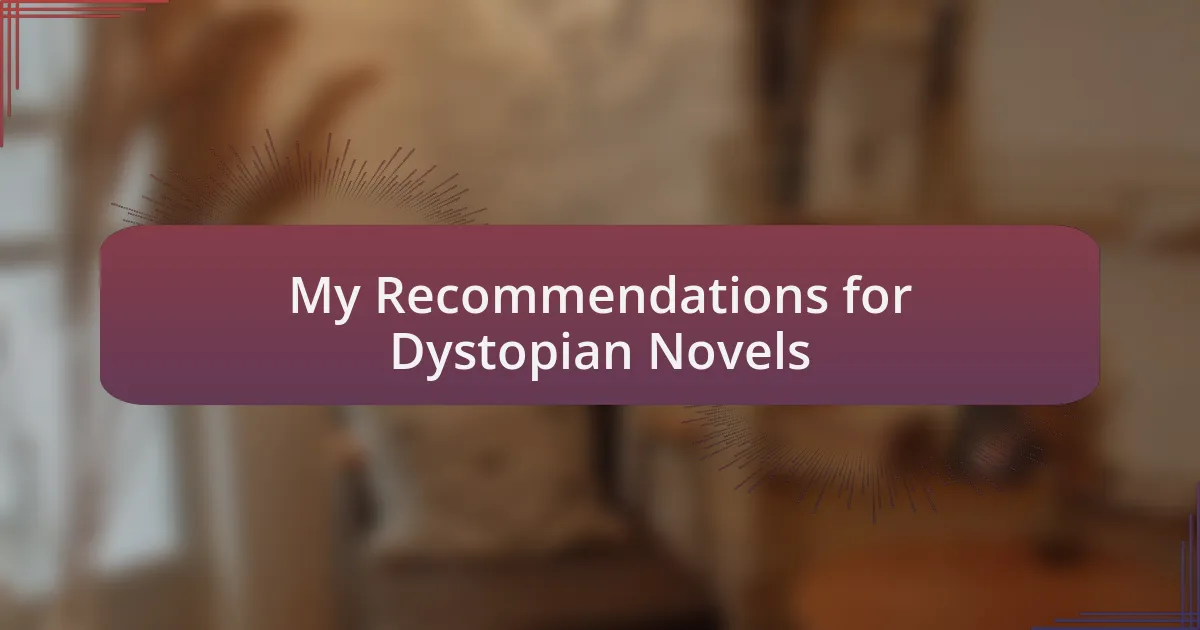
My Recommendations for Dystopian Novels
When I think about my favorite dystopian novels, “1984” by George Orwell always stands out. The chilling portrayal of a surveillance state not only sparked my interest in literature but also made me reflect on the implications of government control in our own world. Have you ever read a book that forced you to reconsider your beliefs? For me, Orwell’s work was that catalyst.
Another title I highly recommend is “Station Eleven” by Emily St. John Mandel. This novel seamlessly blends the aftermath of a pandemic with the deep human connections that persist even in chaos. I found it haunting yet beautiful, as it explores the importance of art and culture in rebuilding a shattered world. It’s a reminder that even in our darkest moments, hope can shine through.
Lastly, if you haven’t picked up “The Power” by Naomi Alderman, I urge you to do so. It flips the dynamics of power on their head, which left me both fascinated and disturbed. The concept of women developing the ability to release electrical jolts and how society shifts as a result is both thrilling and thought-provoking. It made me question: What if the tables were turned? How would that reshape our understanding of power? That pondering is what makes dystopian fiction so compelling.